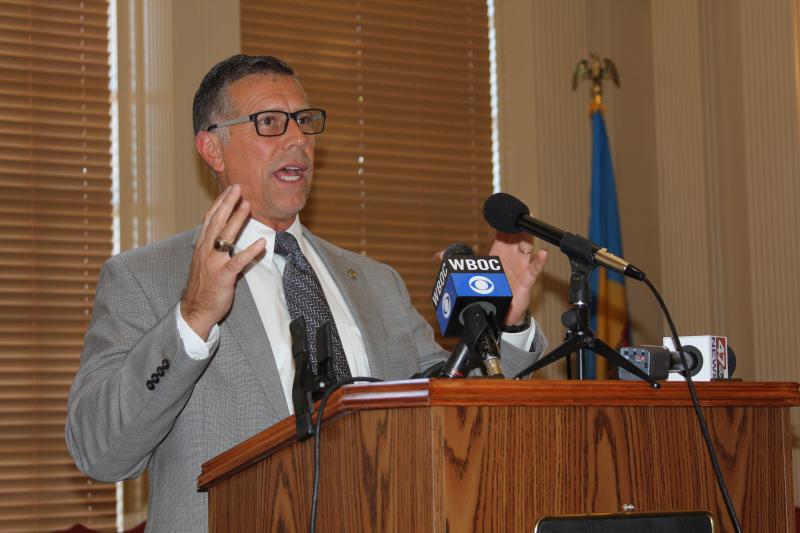Proposal seeks to reinstate jail bonds
In 2018, Rep. Steve Smyk voted for a bill to change the bail system for defendants charged with crimes. The Milton Republican said he voted for it because he believed there were standards that would be met to keep violent offenders off the street.
Smyk said today’s bail system is not working.
“Preventative deterrents were supposed to be part of the deal. It was supposed to be part of the risk assessment,” he said. “Overall, risk assessment is not working.”
Pointing to an inch-thick stack of arrests since the new bail bill went into effect in January 2019, Smyk said the risk assessment used by judges to determine bail for an offender is letting too many violent offenders back on the street.
“Those given low bonds are a threat to our society,” he said.
In May, Smyk said, an offender accused in a shooting was immediately released, and a week later was charged with assaulting a police officer and drug dealing. Another, who posted bond and was released from Sussex Correctional Institution, was back in after shooting at others. And the list goes on and on, he said.
“We used to put the victim first, and now we’re putting the defendant first,” Smyk said.
Smyk, Sen. Colin Bonini, R-Camden, and law enforcement representatives gathered at Legislative Hall Oct. 15 to introduce legislation that would repeal the 2018 bill that changed today’s bail system.
“Delaware is a more dangerous place today than it was a few years ago,” said Bonini. “Some folks who are clearly dangerous who would otherwise have had bail set and usually would have been detained are now being automatically released into the public, and those people are committing crimes.”
In one recent case, Bonini said, two people were charged in an incident in which one pulled a gun on a victim and another pistol-whipped the victim. Bonini said the person who pistol-whipped the victim was let out on unsecured bond and the person who held the gun on the victim walked after posting $20.
“We are creating more victims in Delaware,” he said. “Somebody called it a ‘Get out of jail free’ card. It’s not even that. It’s a ‘Not go to jail’ card … We have made our constituents less safe, not more safe.”
Representatives of the law enforcement community echoed concerns with reduced or zero bail.
Middletown Police Chief Rob Kracyla said not only are constituents in danger when criminals are let back on the streets, but so are police officers. He shared a recent incident in which police arrested a man for domestic violence, but he was released on his own recognizance by a judge and six hours later, police arrested the man again. The same judge released the man for a second time, Kracyla said.
“The bail system does work,” he said.
Fred Calhoun, president of the Delaware Fraternal Order of Police, said his group has questioned the long-term changes of bail reform. “My organization is concerned about the direction that folks are going with how we address crime in this state,” he said.
Most of all, he said, the biggest concern is that people have stopped recognizing the victims.
“When cops get out there and do this job, and they do it over and over again and they see the same faces all the time, they start to see the same victims all the time,” he said. “The looks on their faces are the same. They might be different faces, but the looks are the same. We in this community are tired of people being victimized and the ones that victimize them not being held accountable for their actions.”
Jeff Horvath, former Lewes police chief and now executive director of the Delaware Police Chiefs’ Council, said bail reform has failed to keep the community safe.
“One of the things that was forgotten in the bail reform bill was preventative deterrents. It puts people away to where they can’t commit a crime if they can’t make the bond,” he said. “A person who is a victim of a violent crime has the right to feel safe after that arrest is made. When somebody walks out without even putting a dollar down … there’s not a victim who feels comfortable with that, and it’s a very uncomfortable phone call for law enforcement to make to tell them the person that did this to you is now free.”
Bonini said he expects bipartisan support for the bill because all legislators are hearing about crime in their communities. Even if legislators do not support a full rollback of the bill, he said, his proposal at least starts a discussion.
“It’s a starting point,” Bonini said.
Melissa Steele is a staff writer covering the state Legislature, government and police. Her newspaper career spans more than 30 years and includes working for the Delaware State News, Burlington County Times, The News Journal, Dover Post and Milford Beacon before coming to the Cape Gazette in 2012. Her work has received numerous awards, most notably a Pulitzer Prize-adjudicated investigative piece, and a runner-up for the MDDC James S. Keat Freedom of Information Award.




















































